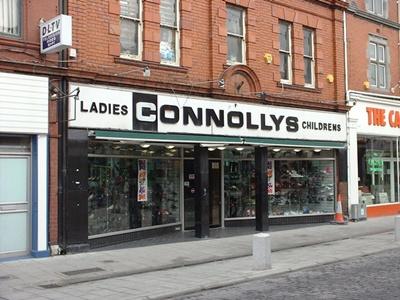Breakdown in communication blamed for closure of Connollys Shoes

Staff undertaking strike action have worked a combined 170 years at the shop. By Philip Pilkington.
After twelve weeks of strike action by its employees, Connollys Shoes in Dun Laoghaire has been forced to close resulting in the loss of six jobs. The strike was undertaken by the Connolly workers in response to what they describe as a breakdown of communication on behalf of management.
After a series of one day strikes last September management entered into negotiations with the workers.
Last November these negotiations faltered and tensions simmered until the current strike broke out in response to the dismissal of two employees who refused to sign new contracts without prior negotiation.
Mandate, the Connolly workers’ trade union, has blamed the strike on failure by the management to engage in negotiations with the workers. “We have been available to talk since the beginning of this dispute,” said Mandate representative Keith Pollard, “The closure of the store was completely avoidable. This could have been straightened out if the Connolly management had been willing to enter into a meaningful dialogue.”
Matt Connolly, who took over directorship from his father last year, stated at the beginning of the dispute that he would not negotiate terms with Mandate or recognise them as his employees’ union. Mandate, however, said that they were willing to step aside and allow negotiations to take place through a neutral mediator.
“The Connolly management refused invitations to negotiate from the labour relations committee, local business owners and Eamon Gilmore TD,” said Mr. Pollard.
Mr. Connolly blames the strike on the workers and their union. He also said that Mandate “appear to validate the bullying and intimidation of our customers at the picket line.”
The strikers and the union deny this; they say that both the public and local businesses have been extremely supportive of them throughout the period of the industrial action.
When asked would they be willing to accept pay-cuts and reduced hours both Mandate and the strikers confirmed that these terms would be acceptable.
“This could have been avoided if the management had sat down and talked,” said veteran Connolly employee and striker Pat Byrne, “That’s all we wanted.”
Many of the strikers are long serving members of the Connolly staff; the five most experienced strikers have worked a total of 170 years at the shop. Mandate point out that during this time they have never had to intervene on behalf of these or any other Connolly workers.
Last January the Labour Rights Commission found Mr. Connolly to be in breach of the Payment of Wages Act 1991 and ordered him to pay compensation for lost wages and sick leave to three of his workers.
Mandate point out that Mr. Connolly failed both to attend the hearings and to pay the compensation in the six weeks designated by the court.
